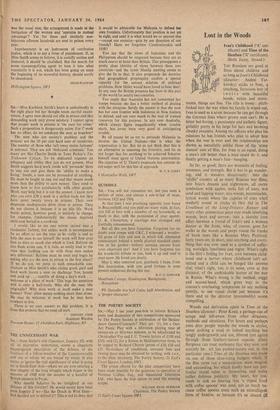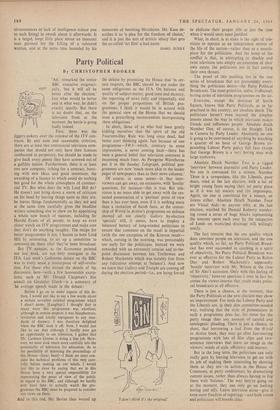Lost in the Woods
Ivan's Childhood ('A' cer tificate) and Time of the Heathen ('X' certificate). (Both Jacey, Strand.) THE Russians are good at films about children and
so long as Ivan's Childhood
1E (director: Andrei Tar- kovsky) sticks to Ivan, a
touching, ferocious boy of twelve with beautiful hands, wrists and move- ments, things are fine. The title is ironic: pitch- forked into the war when his family is wiped out, Ivan is used as a scout because he can get through the German lines where grown men can't. He is bitter but loving, a passionate and pathetic figure, girlishly pretty in his large fur hats and becming chunky sweaters. Among the officers who plan his missions he has friends who plan to adopt him when the war is over and the relationships are shown as mercifully unlike those of the 'army mascot' sort of film, for Ivan is an equal, doing a man's job better than a man could do it, and finally getting a man's fate—hanging.
So far, so good; there are moments of feeling, tenseness, and strength. But it has to go wander- ing, and it wanders disastrously: into the 'idyllic' country of so many Russian war films, into Ivan's dreams and nightmares, all corny symbolism with apples, wells full of stars, wet sand and lapping water; into woods, interminable, lyrical woods where the cupolas of trees whirl tenderly round in circles as they did in The Loneliness of the Long-Distance Runner and every other pretentious piece ever made involving woods, boys and sorrow; into a sketchy love affair between a friend of Ivan's and a woman dootor at the front, who, of course, goes for walks in the woods and peeps round the trunks of birch trees like a Russian Mary Pickford, forty years on; in short, into anything and every- thing that was ever used as a symbol of suffer- ing, nostalgia, loneliness and regret. What's right is the film's feeling for Ivan, torn between child- hood and a horror where childhood isn't ad- mitted and a child can be hanged like anyone else; what's right, too, is its sense, even at this distance, of the unthinkable horror of the war in Russia. What's wrong is the method, soggy and second-hand, which gives way to the cinema's everlasting temptation to say nothing prettily, to use visual clich6 just because it's there and to the director (presumably) seems compelling.
Woods and derivation again in Time of the Heathen (director: Peter Kass), a garbage-can of scraps and left-overs from •other directors, methods and situations. For hours and perhaps even days people wander the woods in circles, never striking a road or indeed anything but tangly undergrowth and sun, filtered (yet again) through those feathery-leaved cupolas. (Only Bergman can treat sunbeams that way now, and scarcely he: art has pushed nature out, in this particular case.) Time of the Heathen was made
i
on one of those shoe-string budgets which, if the film turns out a masterpiece, seem magical and astounding, but which hardly have any par- ticular moral value in themselves, and make rather dubious publicity. My heart, for one, tends to sink on hearing that 'a tripod fixed with coffee spoons' was used, not so much be- cause coffee spoons seem such an unintelligent form of fixative, as because it's so absurd (if circumstances or lack of intelligence reduce you to such fixing) to swank about it afterwards. It is a turgid, inept little piece about an innocent man pursued for the killing of a coloured woman, and at the same time hounded by his
memories of bombing Hiroshima. Mr. Kass de- scribes it as 'a plea for the freedom of choice,' and it is just the sort of artistic idiocy that gets the so-called 'art film' a bad name.
ISABEL QUIGLY



































 Previous page
Previous page